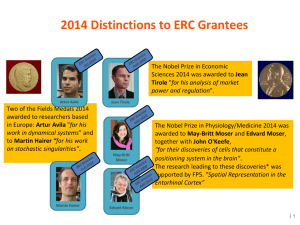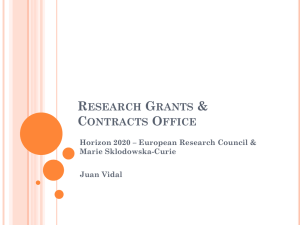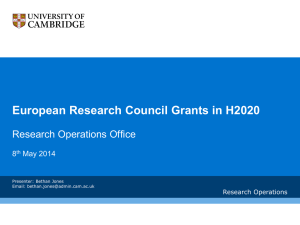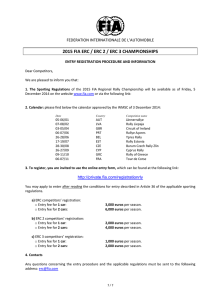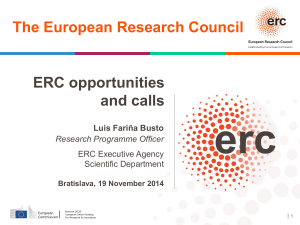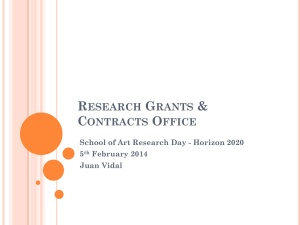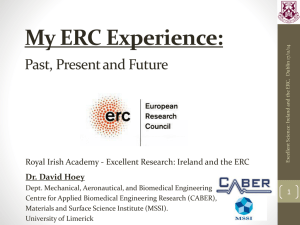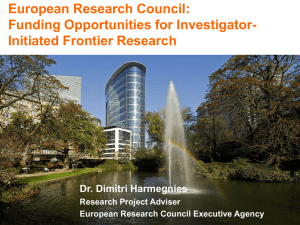European Research Council
advertisement
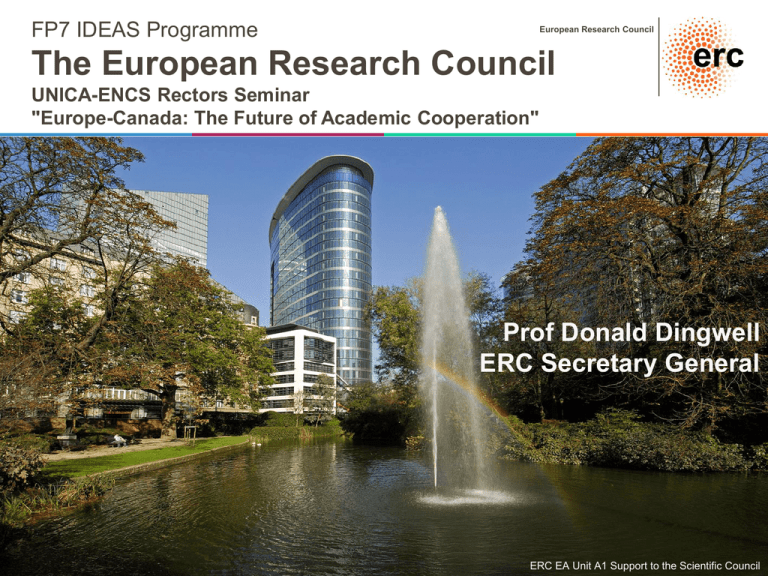
FP7 IDEAS Programme European Research Council The European Research Council UNICA-ENCS Rectors Seminar "Europe-Canada: The Future of Academic Cooperation" Prof Donald Dingwell ERC Secretary General ERC EA Unit A1 Support to the Scientific Council European Research Council What is ERC? The ERC supports excellence in frontier research through a bottom-up, individual-based, pan-European competition Legislation Scientific governance: independent Scientific Council with 22 members; full authority over funding strategy Support by the ERC Executive Agency (autonomous) Excellence as the only criterion Strategy Budget: € 7.5billion (2007-2013) - 1.1 billion €/year Support for the individual scientist – no networks! Global peer-review No predetermined subjects (bottom-up) Support of frontier research in all fields of science and humanities │2 After 5 years of existence… A success story European Research Council Highly recognised by the research community ~3 000 top researchers selected (65% are at early-career stage); 56 nationalities represented Working in >500 different institutions in 27 countries Highly competitive (average success rate 12%) 50% of grantees in 50 institutions; “Excellence attracts excellence” Benchmarking effect, e.g. pan-European competition among researchers; EU value added Efficient and fast grant management │3 Research Council "Despite being a new, European and thus untried instrument, the ERC has manifestly succeeded in attracting and funding world-class research and is playing an important role in anchoring research talent." . Prestige The independent interim evaluation of FP7 4 Nobel Prize laureates among ERC grantees 3 Fields Medalists currently funded by ERC Konstantin Novoselov Nobel 2010 Theodor Hansch Stanislav Smirnov AdG 2008 Simon Donaldson AdG 2009 Elon Lindenstrauss AdG 2010 James Heckman Jean-Marie Lehn Other Prizes awarded to ERC grantees EMBO GOLD MEDAL 2010 – Jason W CHIN - StG 2007 2011 Prizes awarded to ERC grantees EMBO GOLD MEDAL 2011 - Simon Boulton - AdG 2010 THE SHAW PRIZE IN MATHEMATICAL SCIENCES 2011 - Christodoulou Demetrios - AdG 2009 CRAFOORD PRIZE IN BIOSCIENCES 2011 - Ilkka Hanski - AdG 2008 L'ORÉAL-UNESCO AWARD FOR WOMEN IN SCIENCE 2011 - Anne L'Huillier - AdG 2008 PRINCE OF ASTURIAS AWARD FOR TECHNICAL AND SCIENTIFIC RESEARCH 2011 – Giacomo Rizzolatti - AdG 2009 FEBS|EMBO WOMEN IN SCIENCE AWARD 2011 - Carol Robinson - AdG 2010 BALZAN PRIZE 2011 - Joseph Silk - AdG 2010 MILLENIUM AWARD 2010 – Michael GRATZEL - AdG 2009 WOLF PRIZE 2010 – Anton ZEILINGER - AdG 2008 David BAULCOMBE - AdG 2008 Alain ASPECT – AdG 2010 EUROPEAN LATSIS PRIZE 2010 – Ilkka HANSKI - AdG 2008 │4 European Research Council Future perspectives ERC’s role in the Innovation Union 2020 HORIZON 2020 structure: Excellence Science Industrial leadership Societal challenges EIT JRC Excellent Science: reinforcing and extending the excellence of the EU’s science base and consolidating ERA to make EU’s R&I system more competitive on a global scale European Research Council (proposed budget: 15 billion euro) Future and Emerging Technologies Marie Curie Research Infrastructures │5 European Research Council Budget proposal under HORIZON 2020 H2020 budget € 88 billion ERC budget € 15 billion FP7 budget € 50.5 billion ERC budget € 7.5 billion JRC nonnuclear (3 %) Co-operation (65 %) Capacities (8 %) Societal challenges (39%) EIT (3.6%) JRC (2.5%) ERC (17.1%) People (9 %) Ideas (15 %) Industrial leadership (23.1%) Other Excellent science (14.6%) European Research Council ERC Grant schemes Starting Grants Consolidator Grants starters (2-7 years after PhD) up to € 2.0 Mio for 5 years consolidators (7-12 years after PhD) up to € 2.75 Mio for 5 years Synergy Grants 2 – 4 Principal Investigators up to € 15.0 Mio for 6 years Advanced Grants track-record of significant research achievements in the last 10 years up to € 3.5 Mio for 5 years Proof-of-Concept bridging gap between research - earliest stage of marketable innovation up to €150,000 for ERC grant holders European Research Council Creative freedom of the individual grantee ERC offers independence, recognition & visibility • to work on a research topic of own choice, with a team of own choice • to gain true financial autonomy for 5 years • to negotiate with the host institution the best conditions of work • to attract top team members (EU and non-EU) and collaborators • to move with the grant to any place in Europe if necessary (portability of grants) • to attract additional funding and gain recognition; ERC is a quality label │8 European Research Council Attractive features for researchers from outside Europe Flexibility: Additional “start-up” funding for scientists moving to Europe (EUR 500 000 for Starting and EUR 1 Million for Advanced grantees) Grantee can keep affiliation with home institute outside Europe (“significant part” of work time in Europe, at least 50%) Team members can be based outside Europe Grantee can move within Europe with the grant Negotiation: Several European countries/host institutions assist applicants and reward grantees with top-up funds or long-term professorships European Research Council 25 panels for all areas of science Physical Sciences & Engineering 10 panels Life Sciences 9 panels Mathematics Fundamental constituents of matter Condensed matter physics Physical and analytical chemical sciences Synthetic chemistry and materials Computer science and informatics Systems and communication engineering Products and processes engineering Universe sciences Earth system science Social Sciences & Humanities 6 panels Individuals, institutions and markets Institutions, values, beliefs and behaviour Environment, space and population The Human Mind Cultures and cultural production The study of the human past Molecular and structural biology and biochemistry Genetics, genomics, bioinformatics and systems biology Cellular and developmental biology Physiology, pathophysiology and endocrinology Neurosciences and neural disorders Immunity and infection Diagnostic tools, therapies and public health Evolutionary, population and environmental biology Applied life sciences and biotechnology European Research Council International participation to proposals evaluation 350 321 308 300 Men Women Number of assignments* 266 250 200 196 194 150 114 100 50 125 105 101 85 81 77 66 65 55 41 36 44 27 21 9 5 5 5 37 16 4 3 3 6 4 3 15 11 6 5 3 3 3 1 1 1 0 UK DE FR IT ES NL SE BE AT DK FI PL HU CZ PT EL IE RO BG CY SK LT EE SI CH IL NO TR RS HR IS US JP CA AU TW CL HK RU UA AR MX EU Member States Associated C. International Country of Panel Member's Host Institution Based on the eight ERC StG and AdG calls 2007 - 2011 * Number of instances that experts of a certain country of origin are contributing to the ERC peer review │ 11 European Research Council ERC Competitions 2007-2012 Total number of applications received of which Evaluated* success rates** Funded Starting Grant 2007 9.167 8.787 299 3,4 Starting Grant 2009 2.503 2.392 245 10,2 Starting Grant 2010 2.873 2.767 436 15,8 Starting Grant 2011 4.080 4.005 487 12,2 Starting Grant 2012*** 4.741 4.654 536 11,5 23.364 22.605 2.003 10,6 Advanced Grant 2008 2.167 2.034 282 13,9 Advanced Grant 2009 1.583 1.526 245 16,1 Advanced Grant 2010 2.009 1.967 271 13,8 Advanced Grant 2011 2.284 2.245 301 13,4 8.043 7.772 1.099 14,3 Proof of Concept 2011 - 1&2 151 139 51 36,7 Proof of Concept 2012 - 1*** 75 60 33 55,0 226 199 84 45,8 Starting Grant Advanced Grant Proof of Concept * withdrawn and ineligible proposals not taken into account ** percentage of funded proposals in relation to evaluated proposals *** selected Data as of 30/07/2012│ 12 Evaluated proposals from researchers with non-ERA* nationality European Research Council ERC Starting Grant calls 2009 – 2012 * ERA = European Research Area 100 Evaluated applications 80 60 40 20 0 US Russia StG-2009 China India StG-2010 Canada Australia Ukraine Japan Nationality StG-2011 StG-2012 Brazil Argentina Other Evaluated proposals from researchers with non-ERA* nationality European Research Council ERC Advanced Grant calls 2008 – 2012 * ERA = European Research Area Evaluated applications 80 60 40 20 0 US Russia Canada Australia Ukraine NZ Japan India Argentina China Nationality AdG-2008 AdG-2009 AdG-2010 AdG-2011 AdG-2012 Other European Research Council Applications from Canadian researchers ERC Starting grant calls 2007 - 2012 ERC Advanced grant calls 2008 – 2012 Canadian applications evaluated ERC call LS PE StG-2007 6 18 StG-2009 2 1 StG-2010 8 5 StG-2011 9 13 StG-2012 15 9 AdG-2008 2 7 AdG-2009 2 2 AdG-2010 3 5 AdG-2011 3 2 AdG-2012 1 2 Total: 51 64 SH 8 1 2 5 4 4 5 4 5 38 All domains 32 3 14 24 29 13 8 13 9 8 153 Country of Host Inst UK 55 FR 19 DE 14 CH 14 NL 14 IE 11 ES 7 SE 6 IT 4 Other 9 Total: 153 27 of the Canadian applicants had residence in Canada at the time of application 44 applications from foreign researchers with residence in Canada (of which 39 are Europeans) *) nationality as last declared by the principal investigator ERC grantees with a non-ERA* nationality European Research Council ERC Starting Grant calls 2007-2012 ERC Advanced Grant calls 2008 – 2011 * ERA = European Research Area 60 Number of Grantees 50 Starting grants 40 Advanced grants TOTAL number of grantees with non-ERA nationality : 153 StG and 58 AdG 30 20 10 0 USA Australia Russia Canada India Japan Argentina China Ukraine Others Starting grants 53 14 14 12 12 11 7 7 7 16 Advanced grants 41 3 3 5 0 0 0 0 0 6 Nationality *) nationality as last declared by the principal investigator Data as of 30/07/2012 European Research Council ERC grants awarded to Canadian researchers ERC Starting Grant calls 2007-2012 ERC Advanced Grant calls 2008 – 2011 Geographical distribution Thematic distribution number of grants 8 6 AdG 1 StG 4 6 3 1 2 2 2 2 DE NL CH 0 UK Country of host institution ERC call LS PE StG-2007 1 StG-2011 2 3 StG-2012 3 1 SH Total 1 2 5 1 5 AdG-2008 2 2 AdG-2010 1 1 2 AdG-2011 1 1 Total 7 8 2 17 European Research Council Few grantees from outside ERA Mainly researchers moving/returning from the US Country of residence Argentina Australia Brazil Canada India Japan International grantees 1 1 1 1 2 1 Korea USA Total 16 23 ERA nationals 2 1 1 1 54 59 Total 1 3 1 2 2 2 1 70 82 Note: Researchers residing outside the European Research Area at the time of application European Research Council Team members: internationalisation a sample of 383 on-going projects about 2200 team members without principal investigators • the best represented non-ERA nationalities are: Chinese - 65 (3%), Americans - 52 (2%), and Indians - 51 (2%) • 1% of the team members are Canadians Others non Associated; 9,3 Unknow n/Double; 3,3 BE; 2,4 DE; 10,8 US; 2,4 India; 2,3 CN; 2,9 Others Associated; 1,7 ES; 4,9 FR; 9,7 CH; 2,4 IL; 8,4 FI; 3,0 IT; 13,0 Others EU; 11,3 UK; 4,4 EU: 67% Assoc. Countries: 13% SE; 2,5 PL; 1,8 NL; 3,7 Other Countries: 17% Unknown: 3% Attracting excellent researchers worldwide European Research Council ”ERC goes global” campaign targeting top and emerging research locations Canada Russia Feb.2012 US South West & Mexico 2012 2012 Japan , S.-Korea, Taiwan, Hong Kong China US East Coast July 2012 2013 2013 India 2013 South Africa Brazil, Chile May 2012 March 2012 Singapore, Australia, New Zealand 2013 European Research Council More information on ERC Ideas NCPs http://erc.europa.eu/national-contact-points ERC Website http://erc.europa.eu ERC Helpdesk http://erc.europa.eu/about-erc/links Quarterly ERC e-newsletter and e-News Alerts Euraxess-Jobs http://ec.europa.eu/euraxess/index.cfm/jobs/index New ERC calls Expected Publication Deadline Starting 2013 Consolidator 2013 10 July 2012 7 Nov. 2012 17 Oct. 2012 21 Feb. 2013 Advanced 2013 10 July 2012 22 Nov. 2012 Synergy 2013 10 Oct. 2012 10 Jan. 2013 PoC 2013 10 Jan. 2013 24 April 2013 3 Oct. 2013
